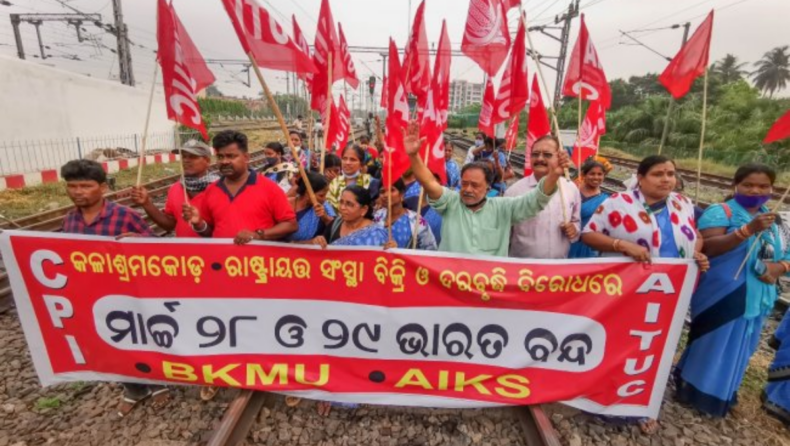A joint forum of trade unions- All India Trade Union Congress (AITUC) has called a two-day Strike i.e Bharat Bandh from Monday.
Trade unions such as INTUC, AITUC, CITU, HMS, TUCC, SEWA, AICCTU, UTUC, and LPF are a part of this joint forum. The nationwide strike aims to impact essential services like electricity, banking, transportation, and railways.
The joint platform of central trade unions held a meeting in New Delhi on the 22nd of March to take stock of the preparations in various states and sectors for the proposed two-day all-India strike on 28th -29th March.
General secretary of AIPUC, Amarjeet Kaur in a conversation with PTI stated,
“We are expecting participation of over 20 crore formal and informal workers with mass mobilization of workers across the country during the strike on March 28th and 29th to protest against government policies”.

Sectors, where notices of strikes have been issued by worker’s unions, include banks, Insurance, Income tax, Postal, Telecom, Power, Oil, Steel, Coal, Copper, and Farming which form the largest informal group especially participation from the rural areas is expected to be huge.
Addressing the media, The Joint Forum of Central Trade Unions said,
” Mass mobilization will be undertaken by unions in railways and defense sectors, in a show of support from the nationwide strike”.
But why protest?
The government of India has passed 4 labor reforms which are: Wage code, Industrial relations, social security, Industrial safety, and welfare.

Through the protest, the worker unions are demanding several policy changes, including the scrapping of proposed changes in labor reform laws, privatization of any kind, and the national monetization pipeline.
Other demands include the regularization of contract workers and increased allocation of wages under the MNREGA scheme.
A few other reasons for the nationwide strike are also against reducing the rate of interest on Employee’s provident fund organization and rising fuel prices.
Essential Services Maintenance Act
Looking at current scenarios there are chances government may apply the EMA Act but despite the threat of the ESM Act workers in a department like roadways, transport and electricity have also announced the decision to join the nationwide strike despite the impending threat.
The ESM Act is likely to be enforced in Haryana and Chandigarh as per the statement delivered by the joint forums.
Furthermore, on Sunday Ministry of Power alerted all the regional and state control room executives to ensure uninterrupted electricity supply round-the-clock and to maintain the stability of the national grid.
Several public sector banks including SBI, PNB, and Canara Bank have stated that their banking services may be partially hit due to the planned nationwide strike but several arrangements have been done to ensure normal functioning.
What is ESMA?
Essential Services Maintenance Act or ESMA is the law that the government can invoke to prohibit striking employees from refusing to work in certain essential services which are necessary for the maintenance of normal life for the citizens of the country.
Any services concerning which the parliament has the power to make laws or the government feels that its discontinuation would affect the maintenance of supplies and services necessary for sustaining life is considered an essential service.
Which services fall under ESMA?
Services related to the public conservancy, sanitation, water supply, hospitals, or related to the defense of the country are considered essential.
Any establishment dealing with the production, supply, or distribution of petroleum, coal, power, steel, and fertilizers also falls under the essential services category. Apart from this, any service in connection with banking can be subjected to ESMA.
Services such as communication, transport, and any government undertaking related to the purchase and distribution of food grains are also subjected to this act.
If ESMA is invoked then the employees can’t refuse to work overtime if their work is considered necessary for the maintenance of the essential.
Is it illegal for essential workers to go on strike?
A strike is not an illegal nor fundamental right but is a legal right, especially in a Democracy under part 3 of the Indian constitution it’s the role played by these workers that raises this question, but the government is empowered to prohibit it if it feels that the strike is gravely disturbing public life.
To enforce this government has to issue a general or special order to end the strike and any strike becomes illegal after the passing of this law.
Possible action against the employees
A person who commences the strike as well as those who instigate it is liable to disciplinary action which may include dismissal because the strike becomes illegal after ESMA is invoked, legal action can also be taken against these employees.
Any police officer is empowered to arrest the striking person without a warrant.
Persons participating in or instigating the strike are punishable with imprisonment which may extend to one year or with a fine or both.
Published By : VATSAL KOTHA
Edited By : KRITIKA KASHYAP













